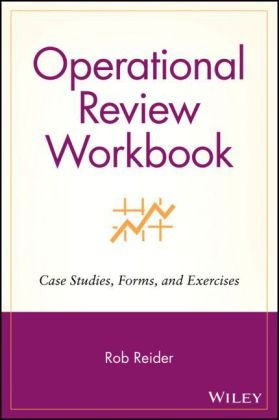Read more
Informationen zum Autor ROB REIDER, CPA, MBA, PhD, is President of Reider Associates (Santa Fe, New Mexico), a management and organizational consulting firm. Prior to founding Reider Associates, he was a manager in the Management Consulting Group of Peat, Marwick, Mitchell Co. (now KPMG). He is the course author as well as seminar leader of over twenty workshops conducted nationally and is also the author of Benchmarking Strategies: A Tool for Profit Improvement and Improving the Economy, Efficiency, and Effectiveness of Not-for-Profits: Conducting Operational Reviews, both from Wiley. He can be contacted at hrreider@reiderassociates.com. Klappentext Practical, proven tools for conducting successful operational reviews An operational review evaluates management's conformity with plans and resource allocations, organizational structure, operating procedures, processes, and controls. In today's volatile marketplace, organizations must do everything possible to ensure their operations are running most economically and effectively to maximize desired results. In such a competitive environment, operational reviews have become increasingly important. The Operational Review Workbook not only gives readers a better understanding of the concepts behind operational reviews but also enables them to conduct reviews with more confidence and authority. A companion to Rob Reider's Operational Review: Maximum Results at Efficient Costs, Third Edition, the Workbook explains the benefits of a review and offers step-by-step guidance through its various stages. In addition to the author's incisive analysis, this practical guide: Includes case studies, checklists, forms, and exercises Reinforces the fundamental principles necessary to perform an operational review Presents in a step-by-step manner how an operational review should be performed Shows how to judge a review's results and make recommendations to management Demonstrates how to use tools and techniques such as financial statement analysis, verification of data accuracy, determination of compliance with laws and regulations, development and understanding of ratio change and trend analysis, use of systems and layout flowcharts, effective interviewing techniques, and preparation and use of survey forms, questionnaires, and checklists Integrates operational review concepts with other analytical processes such as benchmarking strategies and activity-based costing principles The Operational Review Workbook delivers all the tools needed to successfully conduct an operational review of the organization, department, or activity. CEOs, operations management and staff, internal and external consultants and auditors, CFOs and controllers, and other organizational stakeholders will find Reider's incomparable guide an invaluable addition to their professional libraries. Zusammenfassung Based on the information and guidelines provided in Operational Review: Maximum Results at Efficient Costs! this workbook provides case studies! checklists! forms! and exercises to test the readers' comprehension. This workbook: * Reinforces the fundamental principles necessary to perform an operational review. Inhaltsverzeichnis Preface. Introduction. Chapter 1: Overview of Operational Reviews. Stakeholders. Why Businesses Are in Existence. Businesses a Company Is Not In. Some Basic Business Principles. Criteria for Organizational Growth. Mental Models and Belief Systems. Organizational Criteria Example. Economy, Efficiency, and Effectiveness. Specific Objectives. Specific Purposes. Benefits of Operational Reviews. Operational Review Phases. Operational Review Engagement Development. What Functions to Review. Initial Survey. Case Study: Joe Sorry, Inc.<...

